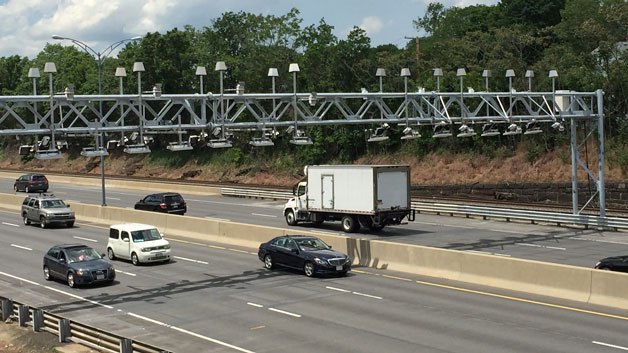Democratic leaders in the House of Representatives on Tuesday brought the toll debate full circle in Connecticut, tell the press yesterday that Connecticut should toll only trucks, something Gov. Ned Lamont campaigned on in 2018, only to reverse his position once in office.
House Speaker Joe Aresimowicz, D-Berlin, and House Majority Leader Matthew Ritter, D-Hartford, said they wouldn’t support tolling all vehicles but said the state should toll trucks, saying they cause most of the damage to Connecticut roads and the revenue could be used to finance low-interest loans from the federal government outlined in Lamont’s CT2030 plan.
“Trucks do 80-percent of the damage to our roads and bridges and many come from out of state,” Ritter said. “We believe that truck-only tolls on select bridges, in a manner similar to what other states do, are legal and will provide Connecticut with the revenue stream needed to secure low interest federal transportation loans.”
The proposal from House Democrats came less than a week after Senate Democrats declined to get behind Lamont’s CT2030 plan, largely because it relied on tolling all vehicles at particular bridges along Connecticut’s major highways.
But the numbers could be a sticking point if the governor hopes to use toll revenue from trucks to leverage federal loans or come close to the toll revenue projected in CT2030.
The original estimate from CT2030 was toll revenue from both cars and trucks at 14 locations throughout the state would raise $464 million annually which, after accounting for operating costs, transfers to municipalities and driver discounts would come to $302 million.
Toll revenue from trucks amounted to $111 million, 39 percent of the total projected revenue. Under the CT2030 plan, trucks would pay a higher toll rate but were still eligible for a 20 percent discount with a CT EZ-Pass transponder.
The CT2030 plan also says that any vehicle would not be tolled more than one round trip per day, amounting to another discount. The discounts and $15 million transfer to municipalities outlined in CT2030 add up to $103.5 million per year.
Based on the governor’s CT2030 numbers, truck-only tolls would bring in a total of $180 million per year – 39 percent of the projected $464 in total toll revenue.
Assuming the discounts for having an EZ-Pass and only charging one round-trip per day remain in place for trucks, that would bring the revenue down to $145 million (39 percent of the $88.4 million in estimated discounts).
However, “Operating, Capital Costs and Diversion” are listed as costing $75.4 million per year, according to the Special Transportation Fund projections in CT2030.
Operating costs are another matter. The toll gantries would still need to be built and maintained and would require administration to collect toll revenue. It is possible that operating costs could be lower because the Merritt Parkway, which does not allow trucks, would not be tolled and there would be fewer transactions because there are fewer trucks than cars.
Even a very low-balled estimate of only 39 percent of the operating costs under a trucks-only plan, brings the net revenue to roughly $115 million, although the operating costs would likely be higher.
The governor was banking on $302 million in toll revenue to back federal loans, but it’s clear those numbers can’t be reached by tolling only trucks.
Even the elimination of discounts and municipal transfers would not make up for the loss of passenger vehicle revenue. To get anywhere near CT2030’s revenue hopes would require a much higher toll rate on trucks, significant cost-cutting from other areas of the transportation fund or reducing the size and scope of CT2030’s projects.
Even the elimination of discounts and municipal transfers would not make up for the loss of passenger vehicle revenue. To get anywhere near CT2030’s revenue hopes would require a much higher toll rate on trucks, significant cost-cutting from other areas of the transportation fund or reducing the size and scope of CT2030’s projects.
The reaction to House Democrats’ call for truck-only tolls came swiftly from the Motor Transport Association of Connecticut and No Tolls CT was swift.
Joseph Sculley, president of the MTAC, said in a press statement that truckers already pay Connecticut fuel taxes for every mile they drive through Connecticut, regardless of whether or not they actually stop for fuel and refuted the statement that trucks cause 80 percent of road damage.
“The claim that trucks do 80 percent of the damage to our roads and bridges is a made up number,” Sculley said. “There is no data to support that statement. In fact, the Federal Bridge Formula ensures that a truck cannot inherently damage a road or a bridge.”
Sculley also pointed out that truck-only tolls on bridges in Rhode Island is the subject of an on-going lawsuit against the state by trucking associations.
Patrick Sasser, head of the grassroots organization No Tolls CT, which has been at the forefront of the anti-toll push, said the organization remains opposed to any tolls, whether or trucks or all vehicles.
“Gov. Lamont campaigned on truck-only tolls and then changed his mind and included all vehicles. There is little reason to think the same thing wouldn’t happen again if the state began to toll trucks,” Sasser said. “The legislature and the governor have done nothing to rebuild trust with the people, and this latest proposal has all the makings of another broken promise.”
The governor issued a statement calling for legislative leaders from both the House and the Senate to meet with him to work out a plan.


Thad Stewart
November 24, 2019 @ 6:58 am
When is the silver spoon baby in the governors seat gonna get it, the people of this state are TAXED enough. Find your millions in reducing government waste and renegotiating the SEBAC agreement.